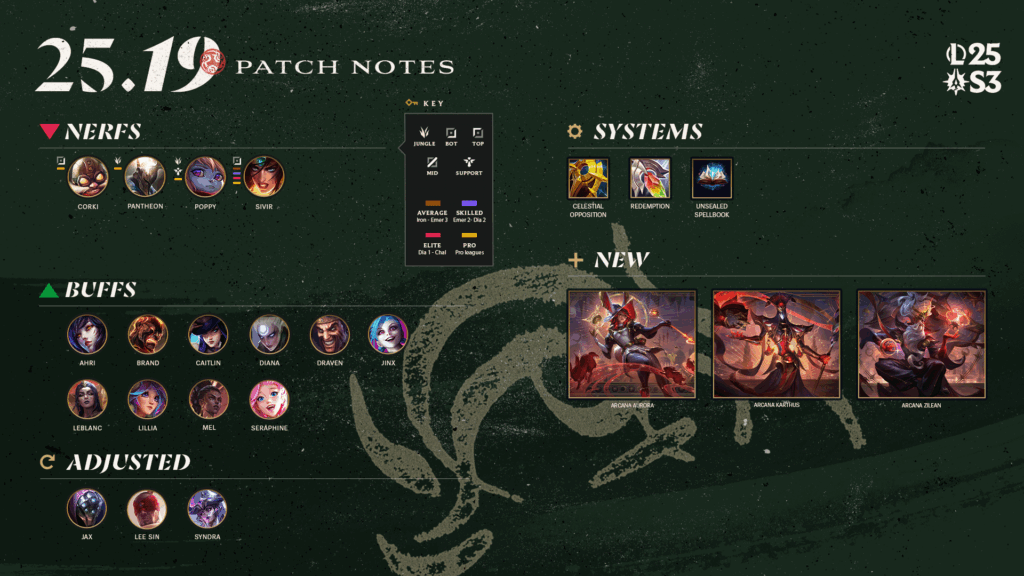Jinx, Draven and Brand Buffed Ahead of League of Legends World Championship
The League of Legends Worlds patch notes have been released, and could be pivotal in altering the meta ahead of the biggest tournament of the year. Draven, Jinx, and Caitlyn all received huge buffs, and a few items got some love, too, while Redemption received a significant nerf to allow other items to shine.
Mixing up the Bottom Lane
In the 25.19 patch, there have been multiple champions in the bottom lane that have been buffed ahead of Worlds. This includes Draven and Jinx, both of which can be devastating if they are snowballing. Draven’s Blood Rush will now give him more attack speed, and his ultimate has been adjusted to have increased damage.
Alongside Draven, Jinx has been buffed as she is an ADC that is frequently missing from the pro play scene. As a result, Riot has tweaked her to try to bring her back to the pro play scene. Her Q has more range in the early game, and her E now deals more damage.
Caitlyn, another threat in the lower ELOs in League of Legends, has now been buffed ever so slightly, receiving an extra two base AD, taking it from 60 to 62. so that she could potentially make it into Worlds this year.

The Worlds 25 patch has seen some key changes to meta items and Champions. Image Credit: Riot Games
Mid Lane Threats
The bot lane wasn’t the only area with focuses in this Worlds’ patch, as Ahri has received a pretty significant buff, alongside champions like Brand, Corki, and Diana. Riot has mentioned that Ahri is quite weak compared to some of the other mid-lane players, so they buffed her ultimate, Spirit Rush, so that taking risks feels worth it again.
Brand, who is one of the more versatile champions and can play in multiple roles, has been given a buff due to being “a little weak, especially in his more income-heavy roles.” His passive, W, and Ultimate have all received significant buffs so that he can get further ahead in those fights. This includes a +70% AP boost to his W and a +30% AP boost to his Ultimate.
Champions such as Diana have a lot of potential in the mid lane, but she is also a versatile champion who can be a jungler. To help her thrive in the jungle, her Monster Modifier has been buffed on her passive so that she can clear a bit more easily, taking it from 2.6x to 3x.
Although LeBlanc has a lot of potential in the mid lane, she has been buffed ahead of Worlds so that she has better wave control and higher burst damage when she’s in combat against her opponent. Riot has acknowledged that she has been used as a support lately, so they are aiming to make her more powerful in places that will benefit her in the late-game side lanes by giving her W and R an +80% AP boost.
Riot has specifically mentioned that they want to see more AP junglers appear at Worlds, so Lillia has received some significant buffs, as she is weak at the moment. Her ultimate has been boosted by a +45% AP boost, and the cooldown has been reduced to 140/120/100.

These Champions and items have been buffed or nerfed ahead of Worlds. Image Credit: Riot Games
Item Adjustments
In the last few patches, Riot has been focusing on balancing out some of the items that are uncommonly used or frequently used by players. This includes Redemption, which has become a very consistent item for tank supports. Previously, it would heal 200-400 (based on target level), and it now heals 150-350. With this change, items such as Locket of the Iron Solari and Knight’s Vow have a good chance to be picked, too.
Just how different the meta really looks at Worlds after this patch remains to be seen, but these changes might give us the opportunity to see some tweaks at the very highest level of League.














